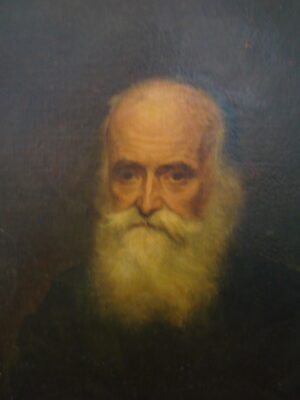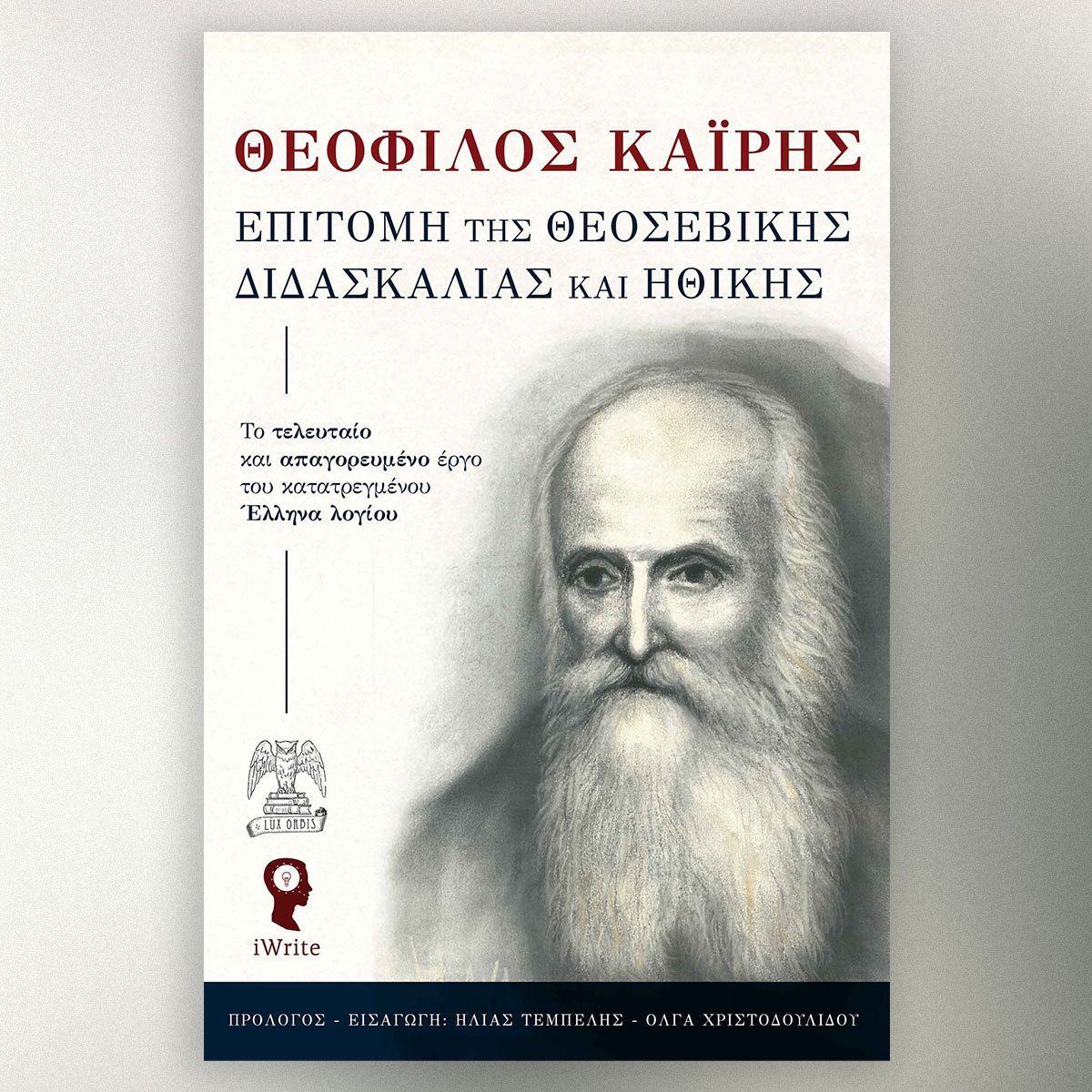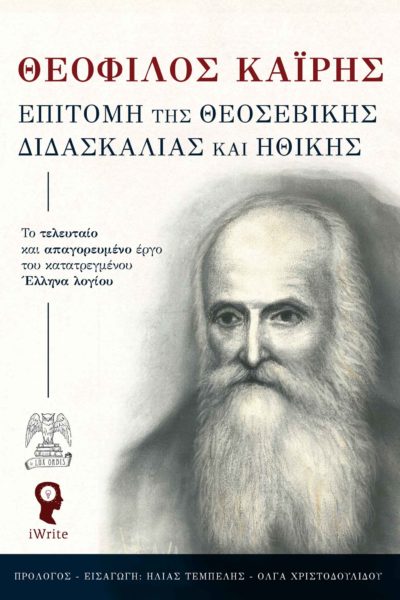Θεόφιλος Καΐρης: ο μάρτυρας του Διαφωτισμού
(από το βιβλίο «Η επιτομή της Θεοσεβικής Διδασκαλίας και Ηθικής» για τον ελληνικό Διαφωτισμό)
Για το βιβλίο «τομή» σε ό,τι αφορά τον ελληνικό διαφωτισμό, γράφει ο Διευθυντής της Σειράς Lux Orbis Μηνάς Παπαγεωργίου.
Στις 7 Απριλίου του 1842.Ο πρέσβης του ελεύθερου ελληνικού κράτους στην Κωνσταντινούπολη, Αλέξανδρος Μαυροκορδάτος, ενημερώνει την κυβέρνηση για την άφιξη στο λιμάνι της πόλης του ατμόπλοιου «Ευανθία». Η είδηση έχει ιδιαίτερη σημασία εξαιτίας ενός επιβάτη του πλοίου, που δεν μπορεί να περάσει απαρατήρητος.
Η «Ευανθία» μεταφέρει στους χώρους της τον Θεόφιλο Καΐρη. Έναν εξόριστο λόγιο με τεράστια προσφορά στην πατρίδα, τόσο κατά τα προεπαναστατικά όσο και στα μετεπαναστατικά χρόνια. Τρία χρόνια νωρίτερα συνέβη η δίκη και δίωξη του φιλοσόφου στην Αθήνα. Η απόφαση για τον περιορισμό του σε μοναστήρι της Σκιάθου (για έναν χρόνο) και αμέσως μετά η διετής απομόνωσή του στη Θήρα.
Η Θεοσέβεια, το κοσμοθεωρητικό μοντέλο που είχε εισαγάγει ο Καΐρης στη διδασκαλία του, είχε προκαλέσει την οργή του Πατριαρχείου. Αλλά και της Ελλαδικής Εκκλησίας, που στα 1841 είχε αποστείλει σε όλες τις ενορίες την καθαίρεσή του από το ιερατείο.
Αναταραχή στην Πόλη
Η άφιξη του Καΐρη στο λιμάνι της Κωνσταντινούπολης προκαλεί φανερή αμηχανία στον Μαυροκορδάτο. Αποφασίζει να διαμηνύσει στον φιλόσοφο «να παραμείνη εις το οποίον ευρίσκεται πλοίον». Αυτή η αμηχανία του Μαυροκορδάτου μεγαλώνει ακόμα περισσότερο από τη στιγμή που η είδηση για την επιτήρηση του ενοχλητικού προσωρινού επιβάτη της «Ευανθίας» αρχίζει να φτάνει ταχύτατα στην πόλη.
Οκτώ ημέρες μετά την πρώτη του αναφορά, ο Έλληνας διπλωμάτης ενημερώνει τους προϊστάμενούς. Πρώην μαθητές και θαυμαστές του Καΐρη στο μεταξύ συγκεντρώθηκαν στο κατάστρωμα του πλοίου, επιθυμώντας να συνομιλήσουν με τον φιλόσοφο. Στο ίδιο έγγραφο, η βαθύτατη πλέον ανησυχία του Πατριαρχείου για την εξέλιξη της υπόθεσης, με τον ίδιο τον πατριάρχη να σχεδιάζει να απευθυνθεί ακόμα και στην ίδια την Υψηλή Πύλη(!) με απώτερο στόχο την απέλαση του Καΐρη από την Κωνσταντινούπολη.
Η αναχώρηση του τελευταίου έγινε από την Πόλη στις 15 του Απρίλη, με κατεύθυνση το Λονδίνο αυτή τη φορά. Ολοκλήρωσε ακόμα μία ενδεικτική φάση των δεινών που αντιμετώπισε ο «απαγορευμένος» φιλόσοφος.

Το προφίλ του Διαφωτιστή
Έντεκα χρόνια αργότερα, τον Ιανουάριο του 1853, ο Θεόφιλος Καΐρης εγκαταλείπει τα εγκόσμια. Επρόκειτο για μία εμβληματική μορφή του πρώτου μισού του 19ου αιώνα, η οποία μάλιστα τα έζησε όλα!
Είχε συμμετοχή στους προεπαναστατικούς αγώνες για τον φωτισμό των Ελληνοπαίδων. Δίδαξε σε διάφορες σχολές και σπούδασε στη Δύση. Αξιοσημείωτο το γεγονός ότι προμήθευσε τη Σχολή των Κυδωνιών με πρωτοποριακά για την εποχή όργανα αστρονομίας, φυσικής, χημείας και γεωγραφίας. Στην ίδια πόλη, μάλιστα, ίδρυσε και τυπογραφείο κατά το 1818. Καθ’ όλη τη διάρκεια του βίου του, ήρθε σε επαφή με λαμπρές προσωπικότητες της εποχής του νεοελληνικού Διαφωτισμού. Σημαντικότερες εξ αυτών τον Αδαμάντιο Κοραή, τον Βενιαμίν Λέσβιο, τον Νεόφυτο Βάμβα και τον Άνθιμο Γαζή.
Πήρε μέρος στην Επανάσταση του 1821 – και πιο συγκεκριμένα στην εκστρατεία του Ολύμπου, από όπου και «κληρονόμησε» τρία τραύματα. Τα επόμενα χρόνια συμμετείχε ενεργά στις πρώτες Εθνοσυνελεύσεις, ενώ μετεπαναστατικά ίδρυσε το περίφημο Ορφανοτροφείο του στην Άνδρο. Προς το τέλος της ζωής του, διώχθηκε ανηλεώς για τις φιλοσοφικοθρησκευτικές του ιδέες. Θεωρούμενος αιρετικός, διατηρώντας παρ’ όλα αυτά ακέραια τη στάση του απέναντι στα νομιζόμενά του.
Αναμφίβολα αποτέλεσε μία αμφιλεγόμενη προσωπικότητα. Επιχείρησε μέσω του μονοθεϊστικής χριστιανικής αντίληψης και συνάμα αρχαιοελληνικών επιρροών κοσμοθεωρητικού συστήματος της Θεοσέβειας να θρησκευτικοποιήσει τον Ορθό Λόγο. Αυτό τον καθιστά ιστορικά ως μία ξεχωριστή περίπτωση λογίου, στις παρυφές του στρατοπέδου των Διαφωτιστών. Πολλές από τις θέσεις και τις απόψεις που διαμόρφωσε επηρεάστηκαν από την ορθόδοξη ιερατική του ιδιότητα. Παρά το γεγονός ότι στην πορεία τον καθαίρεσαν και τον αφόρισαν.
Το βιβλίο που προάγει τον ελληνικό διαφωτισμό
Το βιβλίο είναι το τελευταίο συγγραφικό έργο του Καΐρη, εκδιδόμενο το 1851 στο Λονδίνο. Είναι μία τελευταία απόπειρα του εμπνευστή της Θεοσέβειας να καταστήσει σαφές το περιεχόμενο της κοσμοθεωρίας του για το αναγνωστικό κοινό.
172 χρόνια μετά την πρώτη της κυκλοφορία, η Επιτομή είναι και πάλι διαθέσιμη. Αυτή τη φορά από εγχώριο εκδοτικό οίκο, τυπωμένη σε ελληνικό τυπογραφείο και σε συνθήκες πολύ ευνοϊκότερες. Αν μη τι άλλο μία ετεροχρονισμένη δικαίωση για τον Θεόφιλο Καΐρη. Παρά τις απίστευτες κακουχίες και τα βασανιστήρια του, έμεινε όρθιος ως το τέλος. Μοναδικός, σχεδόν υπέρμαχος των πεποιθήσεών του, υπερασπιζόμενος τις ιδέες και το όραμά του.
Ολόκληρη η σειρά βιβλίων Lux Orbis από τις Εκδόσεις iWrite με ένα κλικ


